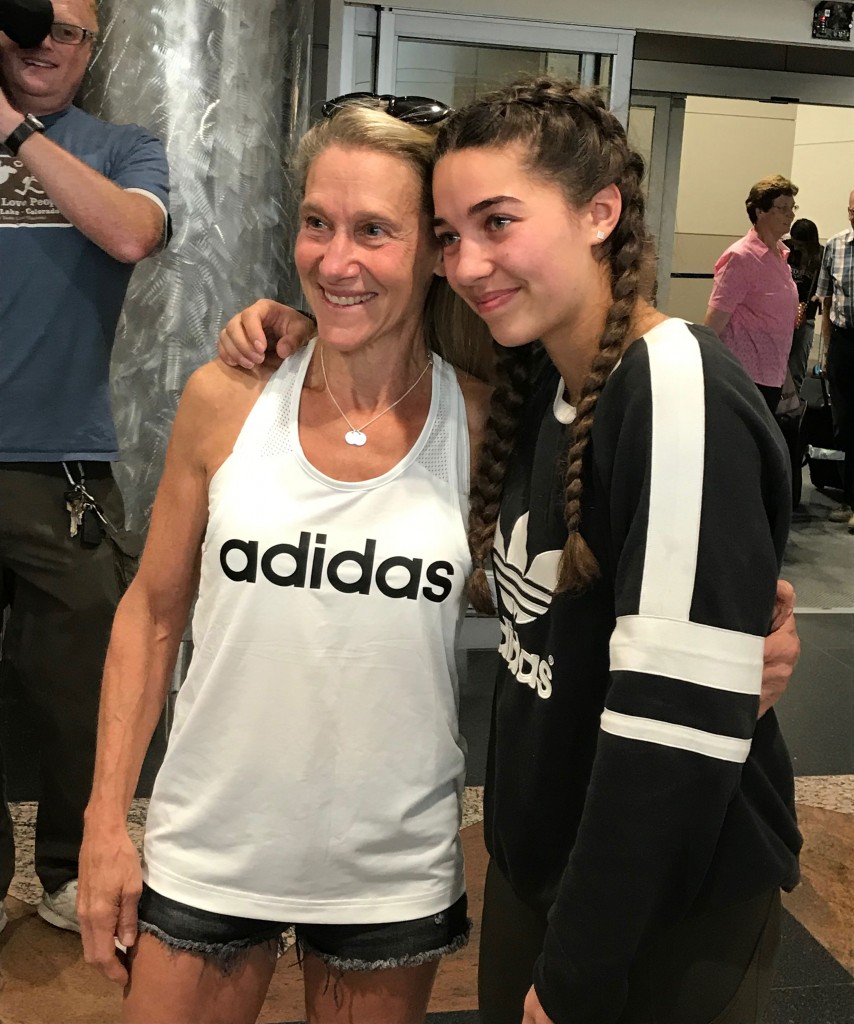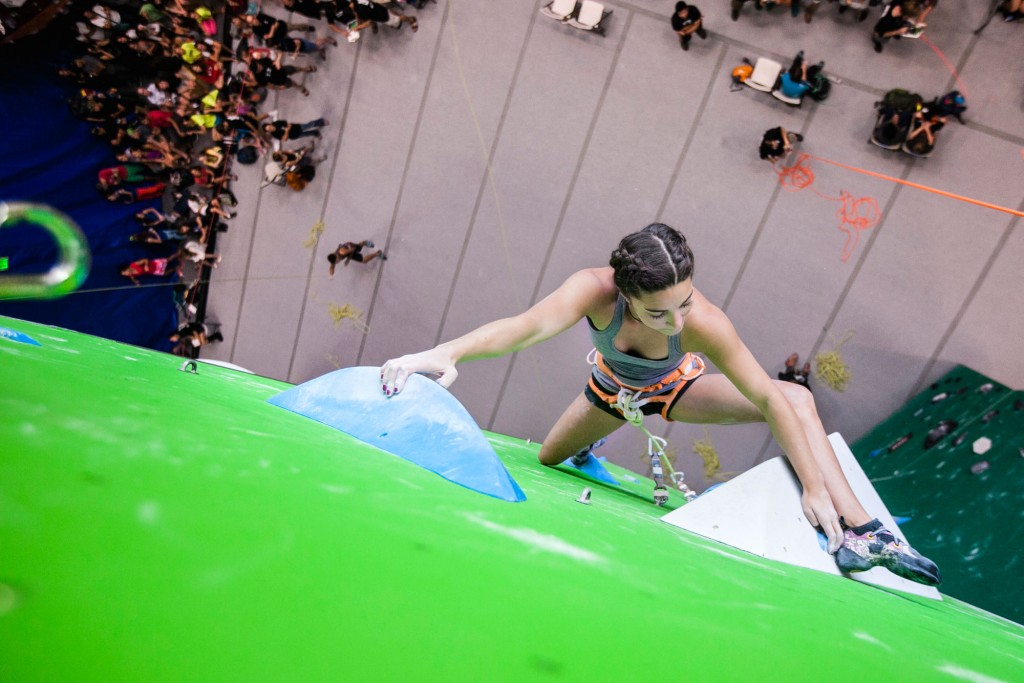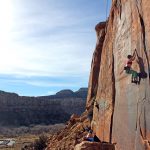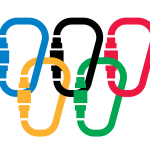// 12 Reasons Why Brooke Raboutou Qualified for the 2021 Olympics
On August 18, 2019, 18-year-old Brooke Raboutou became the first (and currently only) American to qualify to compete in the 2021 Olympics by placing 9th at the IFSC Combined World Championships in Hachioji, Japan. With hundreds of talented female climbers gunning for just 20 spots in the Olympics–only seven of which were up for grabs at the World Championships–Brooke’s qualification is nothing short of spectacular. But why her?
Here are 12 of the hundreds of reasons why Brooke Raboutou qualified for the 2021 Olympics:
But first: Congrats Brooke!
ONE: She’s been climbing since she was a year old.
Sure, she probably tottered up to the easiest downclimb around and maybe got one foot up to tickle the lowest hold, but dabbling in climbing since she could walk and climbing consistently since age four has given her tendons of steal, nearly flawless technique, superior strength, incredible endurance…we could go on, but you get the idea.
TWO: She won the genetic lottery.
Her parents, Robyn Erbesfield-Raboutou and Didier Raboutou, are both world champion climbers. So in the nature or nurture battle, she can check off nature.
THREE: She grew up in an elite climbing family AND facility.
To add to number two above, growing up with elite climbers for parents who continued to dedicate their lives to climbing post having kids checks off the ‘nurture’ side of the nature vs. nurture debate. More importantly, having one of the top kids’ climbing coaches in the world as a mom, coach and mentor didn’t hurt. And, when your mom also owns ABC Kids Climbing, an elite climbing training facility built specifically for kids, and you spend all of your free time there, it’s pretty hard not to improve at climbing. That said, Brooke’s parents clearly did a great job of fueling and supporting her stoke for climbing without pushing her so hard that she burned out–likely another perk of having lifetime climber parents. Shawn, her older brother, is also a talented climber, and we can only imagine that some healthy sibling rivalry might have fueled her progression in the sport as well.
FOUR: She grew up in Boulder, Colorado.
One of the climbing meccas of the country. Many dedicated professional and non-professional climbers move to Boulder for the year-round outdoor climbing access and crusher climbing community. Brooke is a Boulder native, so growing up in a climbing-focused community provided her with friends and mentors outside of her immediate family to fuel her passion, along with loads of outdoor climbing opportunities on a wide variety of rock types.
FIVE: She’s been competing since she was seven.
Which means two things:
1) She has over ten years of experience performing under pressure in competition settings.
2) She grew up in the competition scene after the style had shifted from resembling outdoor rock climbing to more parkour-style movement. Where older World Cup competitors such as Angie Payne and Alex Johnson had to learn coordination dynos years into their competitive climbing careers, Brooke has trained and competed on the new style since approximately day 1.
SIX: She’s a well-rounded climber.
Not only has she earned some impressive competition results (read: wins), she has sent up to V13 and 5.14c outside and was the youngest person to send 5.14b outside at the age of 11.
SEVEN: She knows how to speed climb AND has experience with the combined lead, bouldering, and speed format.
Brooke has competed in speed climbing in youth events for years, including the Youth World Championships, where she took first in the All Around (lead, bouldering, speed) category in 2016. This set her up to feel comfortable competing in all three disciplines back to back–where most older competitors (late 20s+) had never touched a speed wall before they learned about the combined format for Tokyo 2021. At the 2019 World Championships, Brooke preformed best in speed (6th) out of all three disciplines, finishing 7th in lead and 10th in Bouldering.
EIGHT: She’s a sponsored athlete.
Which means she isn’t trying to make ends meet working a 9-5 like most of the rest of us who started climbing in or after college. No, she didn’t quit school to train 10 hours a day, but summers off and financial support for international climbing trips and competitions from some of the top climbing companies in the outdoor industry can’t hurt.
NINE: She doesn’t ‘just climb’.
Spending summers climbing outdoors in France likely helped keep her from burning out on indoor sessions and competitions during the school year, but Brooke has also prioritized school in her non-climbing time. She’s currently a sophomore at the University of San Diego.
TEN: She loves climbing.
Okay, duh, but this one’s important. We all have those days when we don’t feel like going to the gym, but after 14 years of consistent climbing, Brooke has to still be overly stoked on the sport to train and compete at the level she does while in school full time.
ELEVEN: She climbed well when it counted.
All of the above wouldn’t have mattered if she’d had a bad day at finals. Interestingly, Brooke hadn’t climbed her best early in semis, barely qualifying for finals in 19th out of the 20 available spaces. And according to an Instagram post, she had been dissatisfied with her performance at each of her previous World Cup competitions this past season. However, she was able to put any mistakes made early in the competition aside to finish 9th in finals–where it counted.
TWELVE: Luck was on her side.
Seven females qualified for the Olympics at the combined World Championships and Brooke placed 9th. BUT, only two competitors of each gender can qualify from any one nation. Since Japan had four female competitors in the top seven spaces, and they are guaranteed one climber of each gender as the host country for the games, three of the Japanese competitors couldn’t qualify, bumping Brooke into one of the seven qualifying spots.
Dang are we stoked to watch Brooke compete in the Tokyo summer Olympics. It’s always rad, motivating and inspiring to watch her train at EVO Lou when she’s in the Boulder area, and we hope to support her in any way possible as she continues training.
And, of course, our fingers are crossed that more Americans qualify for the games at the World and Pan American Olympic Qualifying events.
Follow Brooke here.









